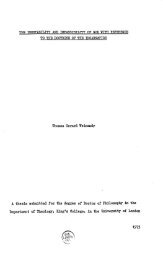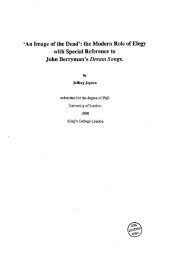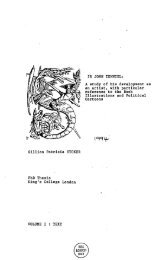- Page 1 and 2:
Leadership among the Samnites and r
- Page 3 and 4:
Acknowledgements I am most thankful
- Page 5 and 6:
2.4. Administrative institutions ..
- Page 7 and 8:
6.6.1. Bronze coins with the legend
- Page 9 and 10:
Abbreviations Bu = Buck, C. D., A G
- Page 11 and 12:
Chapter 2 looks at what the account
- Page 13 and 14:
unification of Italy and the growth
- Page 15 and 16:
was qualified by the place-name of
- Page 17 and 18:
dictatorship of the Latin states. 1
- Page 19 and 20:
narrowed the meaning of touta down
- Page 21 and 22:
tuticus was consequently an urban o
- Page 23 and 24:
2.1. Introduction Chapter 2. Highla
- Page 25 and 26:
century BC and the Social War. 53 F
- Page 27 and 28:
esurrected by the Pentri in second
- Page 29 and 30:
their country, the Romans decided t
- Page 31 and 32:
princeps. 77 The titles imperator a
- Page 33 and 34:
that he had captured Taurasia, Cisa
- Page 35 and 36:
that the Romans had rebuilt the des
- Page 37 and 38:
Beneventum, in the upper valleys of
- Page 39 and 40:
the name of the place to Italia. He
- Page 41 and 42:
2.2.5. Voting tribes and Augustan r
- Page 43 and 44:
southernmost part of the fourth reg
- Page 45 and 46:
We must, however, ask whether the a
- Page 47 and 48:
dated to the end of the fourth or b
- Page 49 and 50:
heartland as being heavily fortifie
- Page 51 and 52:
Remains of buildings and associated
- Page 53 and 54:
were scattered over the area of the
- Page 55 and 56:
the hill fort of Monte Pallano in t
- Page 57 and 58:
the region. 183 Livy uses the term
- Page 59 and 60:
and the Sangro valley. Aufidena was
- Page 61 and 62:
Samnium, partly because the visible
- Page 63 and 64:
Another surge in building activity
- Page 65 and 66: site was abandoned after the war. O
- Page 67 and 68: It is generally accepted that the w
- Page 69 and 70: Vestini and Paeligni. Some of the p
- Page 71 and 72: i still left with the question of w
- Page 73 and 74: three stamps in which the name of t
- Page 75 and 76: second Stabidinus is plausibly the
- Page 77 and 78: the first half of the second centur
- Page 79 and 80: pak(is). staiis. 1(üvkieis). m(edd
- Page 81 and 82: .ý -ý: ordered or approved by a c
- Page 83 and 84: pürtam. liis[eis az2 pü]d safinim
- Page 85 and 86: the Samnites during the Samnite and
- Page 87 and 88: Marcus Lamponius (App., B. C. 1.42.
- Page 89 and 90: Table 4: The Staii as meddices tuti
- Page 91 and 92: produced a magister for the Samnite
- Page 93 and 94: 2.6. Conclusions Literary accounts
- Page 95: fort of Roccagloriosa and some hill
- Page 98 and 99: Although they suggest that the medd
- Page 100 and 101: Capua is preserved in Stephanus Byz
- Page 102 and 103: Samnites. 347 Dionysius's passage,
- Page 104 and 105: Campanian issues as well, thus sugg
- Page 106 and 107: BC, after the final defeat of the L
- Page 108 and 109: supervise the introduction of new r
- Page 110 and 111: settled in 334 BC. 379 But the Fale
- Page 112 and 113: Litemum and Puteoli in 194 BC; 392
- Page 114 and 115: Bantina, an Oscan constitution, is
- Page 118 and 119: We have twenty-six iüvilas inscrip
- Page 120 and 121: same structure: the name or names o
- Page 122 and 123: [These three are the iüvilas] of P
- Page 124 and 125: inscriptions ST Cp 27,29, and 30, a
- Page 126 and 127: The inscription ST Cp 32 suggests t
- Page 128 and 129: ekluva[tiium] 2diuvia. [is] 3damu[s
- Page 130 and 131: ST Cp 19, Ve 93, Co 112, FdB 1, He
- Page 132 and 133: Sulpicius Rufus to be built at publ
- Page 134 and 135: Triphius Virrius, were probably put
- Page 136 and 137: Etruscan gens Ane. 486 Heurgon, cit
- Page 138 and 139: were established in the city, but t
- Page 140 and 141: The main source of information for
- Page 142 and 143: 4.1. Introduction Chapter 4. Cumae
- Page 144 and 145: It is difficult to know where exact
- Page 146 and 147: earlier Greek agora, the later foru
- Page 148 and 149: still contained Greek elements. 533
- Page 150 and 151: Although Sgobbo's reading of the wo
- Page 152 and 153: own magistrates, but was represente
- Page 154 and 155: Modern interpretations of the expre
- Page 156 and 157: Rix's argument is unconvincing. Fir
- Page 158 and 159: Cumae and Pompeii. These cities, al
- Page 160 and 161: the name of the town. 566 Justin, w
- Page 162 and 163: Rome and Naples. 577 One may doubt,
- Page 164 and 165: Nola, Naples and Cumae in 216 BC 58
- Page 166 and 167:
with the late period of the Hyrina
- Page 168 and 169:
5.4.1. Magistrates at Nola and Abel
- Page 170 and 171:
Romans held censuses every five yea
- Page 172 and 173:
Pacius Calavius son of Pacius m. d.
- Page 174 and 175:
written out in full. Rather, I thin
- Page 176 and 177:
amnüd. puz. idik. sakara[klüm] in
- Page 178 and 179:
Side B Lines 23-26: But the Nolans.
- Page 180 and 181:
name and his office (all dative sin
- Page 182 and 183:
a number of scholars, I do not beli
- Page 184 and 185:
Out of the three gens names of the
- Page 186 and 187:
towns. Literary sources mention dis
- Page 188 and 189:
1. He argued that the expression r6
- Page 190 and 191:
investigated whether this ethnic re
- Page 192 and 193:
mentioned by Thucydides, who says t
- Page 194 and 195:
the wars ended with the town being
- Page 196 and 197:
and from the Labican' 684 Beloch no
- Page 198 and 199:
fighting on several fronts, in Apul
- Page 200 and 201:
admission, so they made their way t
- Page 202 and 203:
loose federation of settlements he
- Page 204 and 205:
Pompeianus and guaestor Pompeianus.
- Page 206 and 207:
late third, early ST Po 1 Caratelli
- Page 208 and 209:
v(iibis). püpidiis. v(iibieis). me
- Page 210 and 211:
possibility is that they are the ow
- Page 212 and 213:
fragmentary inscriptions, Ve 9 and
- Page 214 and 215:
supply uninterrupted and to give ga
- Page 216 and 217:
appears on the altar found in templ
- Page 218 and 219:
6.3.5. Other institutions It is als
- Page 220 and 221:
1. ST Po 34, Ve 23, Co 60, Bu 14, P
- Page 222 and 223:
urubla[nu. ant. tiu]rri. 7mefira. f
- Page 224 and 225:
meaning `goings'. He supposed that
- Page 226 and 227:
the Latin noun fama, with the meani
- Page 228 and 229:
4. ST Po 43, Ve 30b, Co 71, Zvetaie
- Page 230 and 231:
since the programmata were not noti
- Page 232 and 233:
quinquennalis or quaestor. Mommsen
- Page 234 and 235:
makes sense only if they were votin
- Page 236 and 237:
of the town. Maraeus Atranus son of
- Page 238 and 239:
Numerous nomina gentilicia of magis
- Page 240 and 241:
6.5. Meddices of Minerva A unique i
- Page 242 and 243:
of Mefitis and Privati of Stabiae,
- Page 244 and 245:
Most of the coins with the legend a
- Page 246 and 247:
6.6.2. Silver and bronze coins from
- Page 248 and 249:
story, recorded in local traditions
- Page 250 and 251:
supposed confederation the members
- Page 252 and 253:
structures. 848 The known instituti
- Page 254 and 255:
they were probably filled by electi
- Page 256 and 257:
title. My investigation has led to
- Page 258 and 259:
emarkably wider than in the Greek w
- Page 260 and 261:
In chapters three to six, I have su
- Page 262 and 263:
Antonini, R., `Campani', Studi Etru
- Page 264 and 265:
Bonghi Jovino, M., La necopoliprero
- Page 266 and 267:
Campanile, E., `Note sulla defixio
- Page 268 and 269:
Cebeillac-Gervasoni M., 'Italia: Re
- Page 270 and 271:
Crawford, M. H., Coinage and money
- Page 272 and 273:
De Benedittis, G., 'Sannio (CB): pi
- Page 274 and 275:
Di Niro, A., `Cercemaggiore-Gildone
- Page 276 and 277:
Gabba, E., L'Italia romana (Como, 1
- Page 278 and 279:
Guzzo, P. G. 'L'identitä contradit
- Page 280 and 281:
Joseph, B. D., 'Oscan slaagi-', Glo
- Page 282 and 283:
Larsen, J. A. 0, Greek Federal Stat
- Page 284 and 285:
Lloyd, J. A. Rathbone, D. W. `A Cla
- Page 286 and 287:
Mau, A., `Die oskischen Wegweiserin
- Page 288 and 289:
Onorato, G. 0., `Pompei municipium
- Page 290 and 291:
italica, Atli del convegno della So
- Page 292 and 293:
Salerno', Nuceria Alfaterna e il su
- Page 294 and 295:
Sgobbo, I., `Gli Etruschi in Pompei
- Page 296 and 297:
Thomsen, R., The Italic Regions fro
- Page 298 and 299:
Maps 298
- Page 300 and 301:
zr Cl `>iyo N"i Q"_; Zö...........
- Page 302 and 303:
1r ý, 'ýý 1. ýý}: ýýý ýi l
- Page 304:
A ö 0 a a v a t 0 a 0 N t O CL n°









